JACAR Newsletter
JACAR Newsletter Number 32
September 30, 2020
Contents
Documents Spotlight
Japan and the Founding of the League of Nations: The Process of Appointing Japanese as Staff at the Permanent Secretariat
The League of Nations was founded on January 1, 1920, the day on which the Treaty of Versailles went into force. The League was the first international organization to include countries from all parts of the world. This year marks the centennial since the League was founded. Japan was among the founding members of the League. Until it withdrew on March 27, 1933, in the wake of the Manchurian Incident, it had permanent member status in the Council of the League. In addition to the Assembly and the Council that brought together government representatives (diplomats) from each member state, the League also had a Permanent Secretariat made up of staff (international civil servants) whose status was independent of the governments of the countries from which they came. Several Japanese were also on staff at the League's Secretariat. The fact that any Japanese were appointed as staff independent of their government at an international organization such as this was the first time such a development had ever occurred up to that point. This poses the questions of what sort of people from Japan at the time were chosen to staff the Secretariat, and what kinds of criteria were prized among those who were selected?Two examples of the sorts of people who were selected were Nitobe Inazō and Sugimura Yōtarō, who one after the other served as under-secretaries. Nitobe is famed as the author of Bushido: The Soul of Japan, and as one of the leading "internationalists" of modern Japan. His face even appeared on the ¥5,000 bank note for a time. As for Sugimura, in addition to having worked as a diplomat representing Japan at the League, he is also known for his efforts to win Tokyo's invitation to host the 1940 Olympic Games. Both men had other posts at the League aside from their duties as under-secretaries: Nitobe also served as director of the International Bureaux Section, while Sugimura was director of the Political Section. Another Japanese who was on staff at the Secretariat was Harada Ken, who served as a secretary for first Nitobe and then Sugimura. Three more individuals who may be pointed out were Fujisawa Chikao, Furukaki Tetsurō, and Tsuchida Kaneo. All three worked in the Information Section handling public relations for the League. Beyond these, there were three Japanese—Kitano Toyojirō, Kusama Hiroshi, and Katō Genzō—who had worked as health officials in the Ministry of Home Affairs and were on the staff of the League's Health Section handling matters related to health and hygiene, and Masutani Hideo, who worked (though less than one year) in the Financial and Economics Section. In 1926, the League opened a Tokyo Branch, and Aoki Setsuichi was appointed its director.
When it comes to what distinctive feature these League staffers from Japan had in common, it is the fact that most were young. Of the people mentioned above, Harada, Fujisawa, Furukaki, and Masutani had all graduated from university during World War I. None of them had much work experience prior to their employment as staff persons for the Secretariat. This raises the question as to why such relatively youthful individuals were hired. As a means for understanding this, we turn to documents in the JACAR database that permit us to track the process that led to Fujisawa's employment at the Secretariat when the League was founded.
Initially, hiring for the Secretariat was understood as being undertaken at the discretion of League Secretary-General Eric Drummond. However, in actual fact the way that hiring worked was that the directors of each Section requested the governments of each member state to identify persons who would be suitable candidates to work in their respective Sections. The directors would then recommend those individuals thus identified to Drummond. This is why in August 1919 the Embassy of Japan in Great Britain received a request from League Information Section Director Pierre Comert to ask the Japanese government to introduce him to potential candidates who could work as members of his section's staff (Embassy of Japan in Great Britain Chargé d'affaires Nagai correspondence to Foreign Minister Uchida, No. 383, August 31, 1919, Ref. B04014005000, images 26 to 28). The condition that Comert set down were that the candidates had to be fluent in either English or French and be well-acquainted with current Asian affairs. In reply, Tokyo informed Comert about Sawara Tokusuke (then aged 46), who had worked for many years as a newspaper journalist in Shanghai and at the time was editor-in-chief of the English-language Shanghai Mercury newspaper (see accompanying Images 1 and 2).
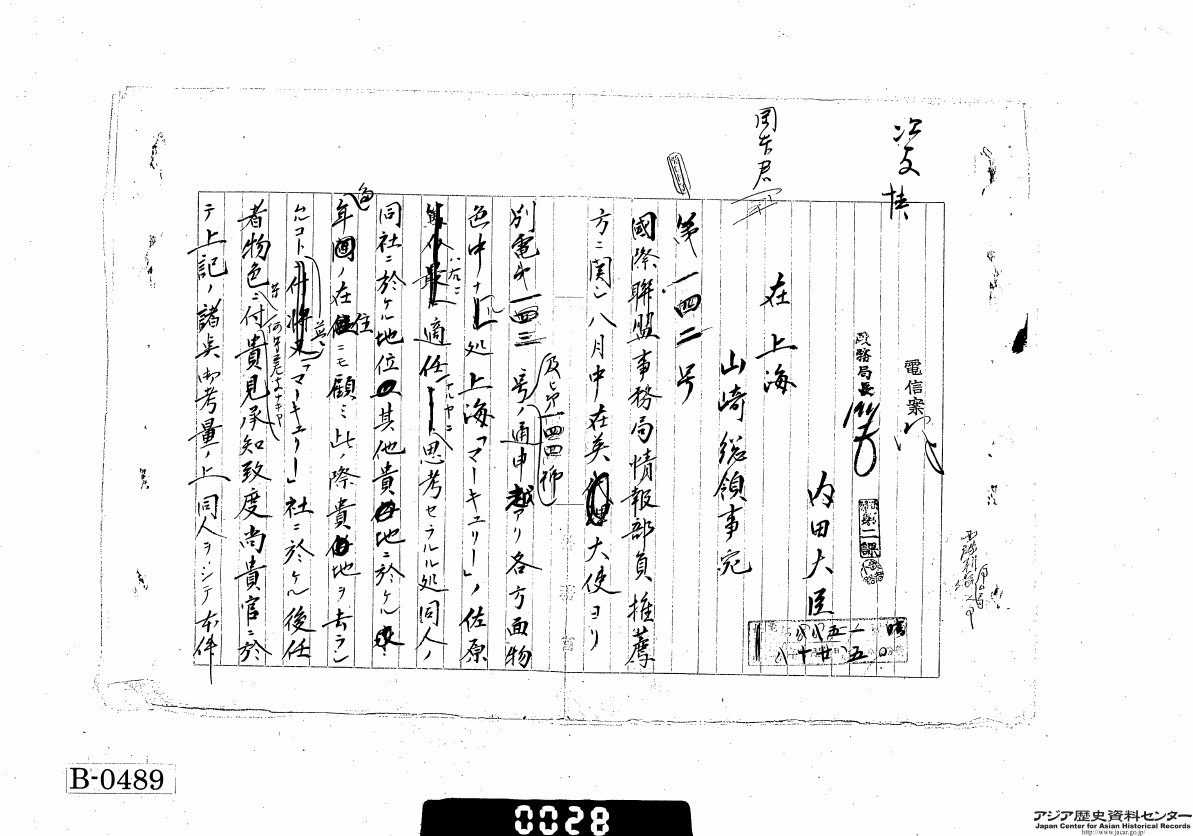 Image 1: Foreign Minister Uchida correspondence to Consul General (Shanghai) Kawasaki, No. 142, October 20, 1919 (Matters Related to League of Nations Secretariat / Personal Matters, Assignments 1 (Ref. B04014005000, image 24).
Image 1: Foreign Minister Uchida correspondence to Consul General (Shanghai) Kawasaki, No. 142, October 20, 1919 (Matters Related to League of Nations Secretariat / Personal Matters, Assignments 1 (Ref. B04014005000, image 24).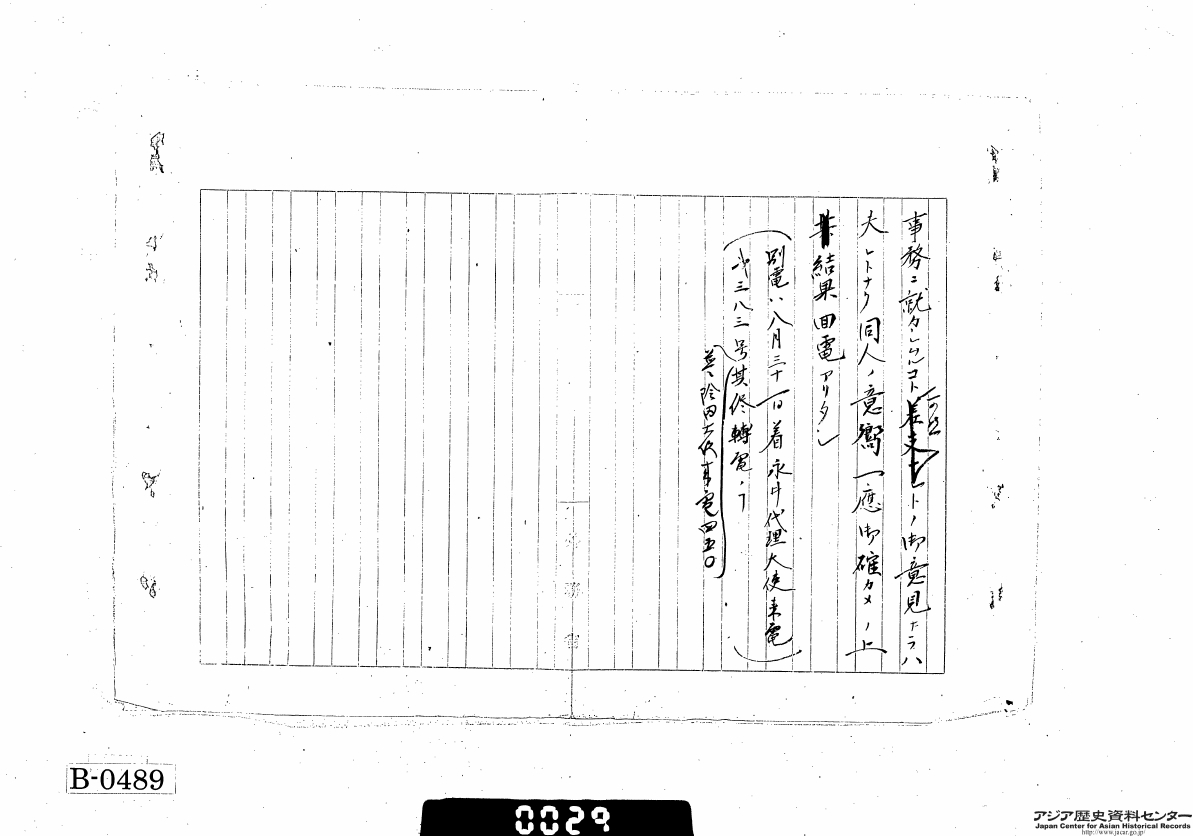 Image 2: Foreign Minister Uchida correspondence to Consul General (Shanghai) Kawasaki, No. 142, October 20, 1919 (Matters Related to League of Nations Secretariat / Personal Matters, Assignments 1 (Ref. B04014005000, image 25).
Image 2: Foreign Minister Uchida correspondence to Consul General (Shanghai) Kawasaki, No. 142, October 20, 1919 (Matters Related to League of Nations Secretariat / Personal Matters, Assignments 1 (Ref. B04014005000, image 25).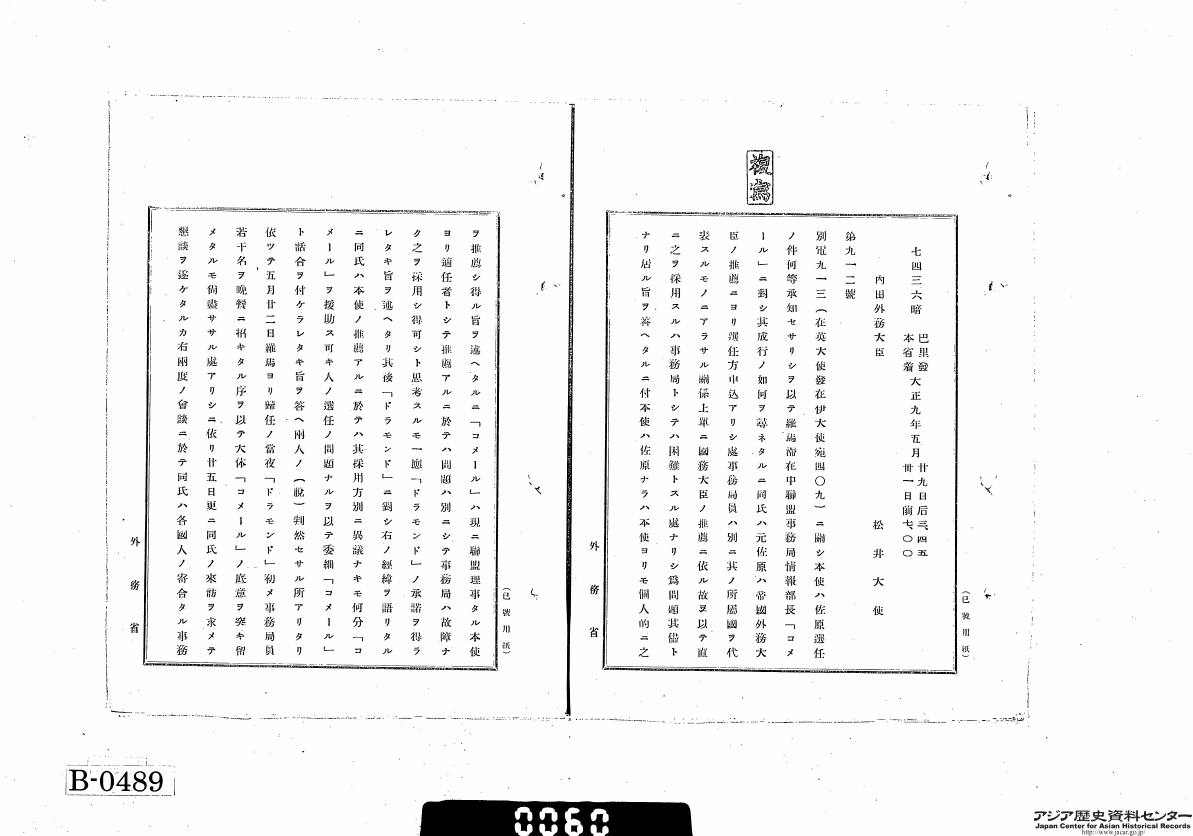 Image 3: Ambassador to France Matsui correspondence to Foreign Minister Uchida, No. 912, May 29, 1920 (Matters Related to League of Nations Secretariat / Personal Matters, Assignments 1 (Ref. B04014005000, image 55).
Image 3: Ambassador to France Matsui correspondence to Foreign Minister Uchida, No. 912, May 29, 1920 (Matters Related to League of Nations Secretariat / Personal Matters, Assignments 1 (Ref. B04014005000, image 55).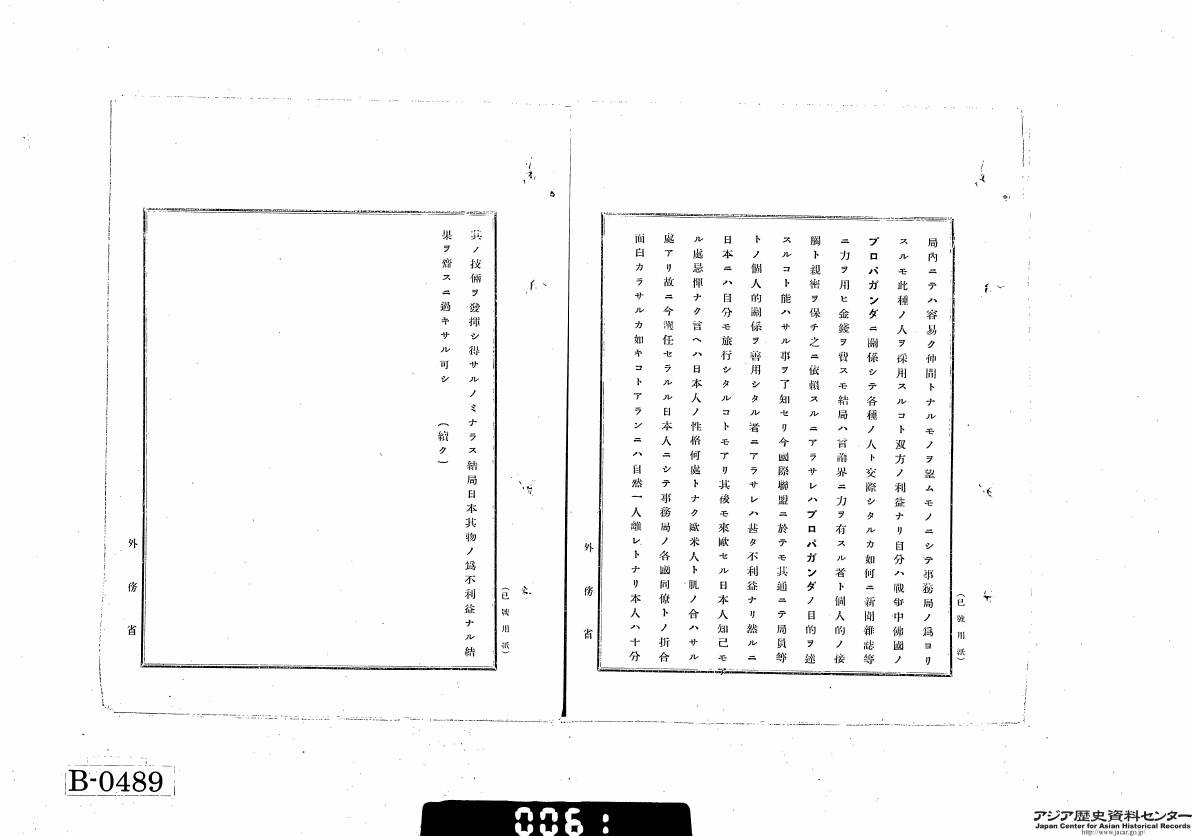 Image 4: Ambassador to France Matsui correspondence to Foreign Minister Uchida, No. 912, May 29, 1920 (Matters Related to League of Nations Secretariat / Personal Matters, Assignments 1 (Ref. B04014005000, image 56).
Image 4: Ambassador to France Matsui correspondence to Foreign Minister Uchida, No. 912, May 29, 1920 (Matters Related to League of Nations Secretariat / Personal Matters, Assignments 1 (Ref. B04014005000, image 56).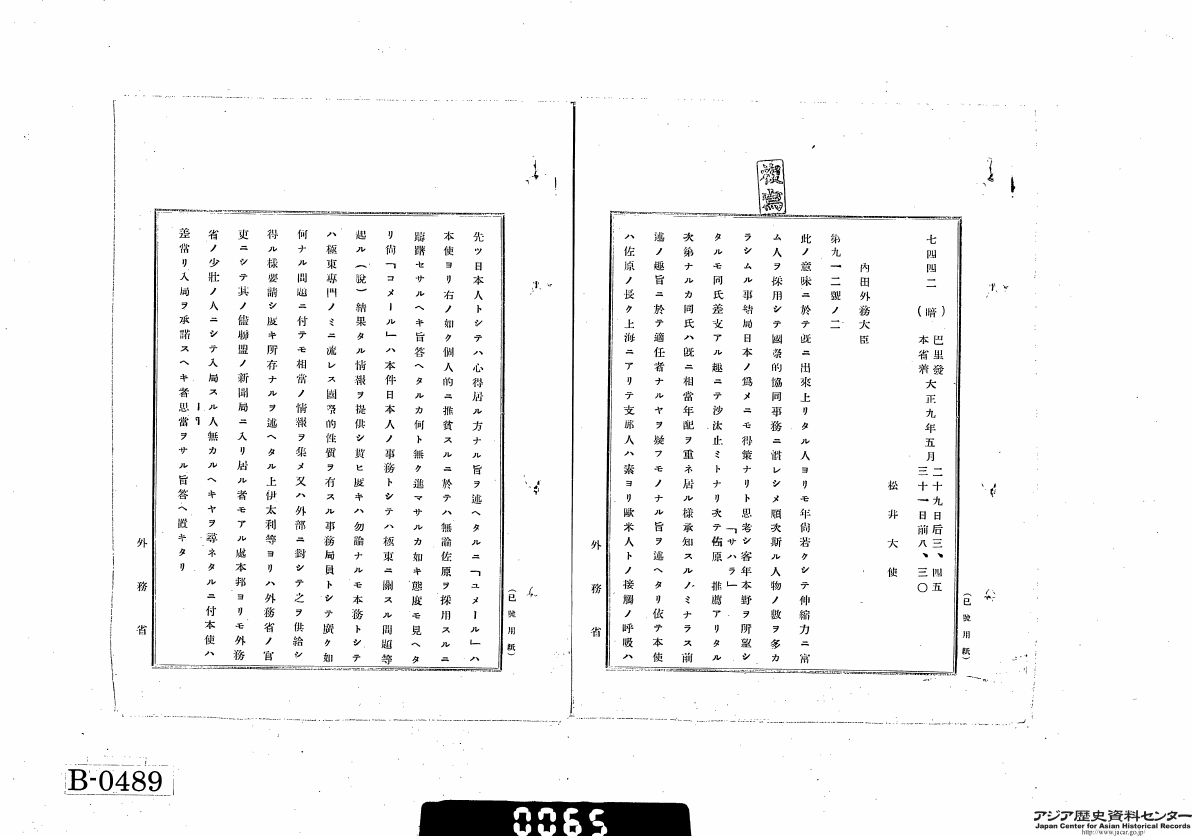 Image 5: Ambassador to France Matsui correspondence to Foreign Minister Uchida, No. 912, May 29, 1920 (Matters Related to League of Nations Secretariat / Personal Matters, Assignments 1 (Ref. B04014005000, image 60).
Image 5: Ambassador to France Matsui correspondence to Foreign Minister Uchida, No. 912, May 29, 1920 (Matters Related to League of Nations Secretariat / Personal Matters, Assignments 1 (Ref. B04014005000, image 60).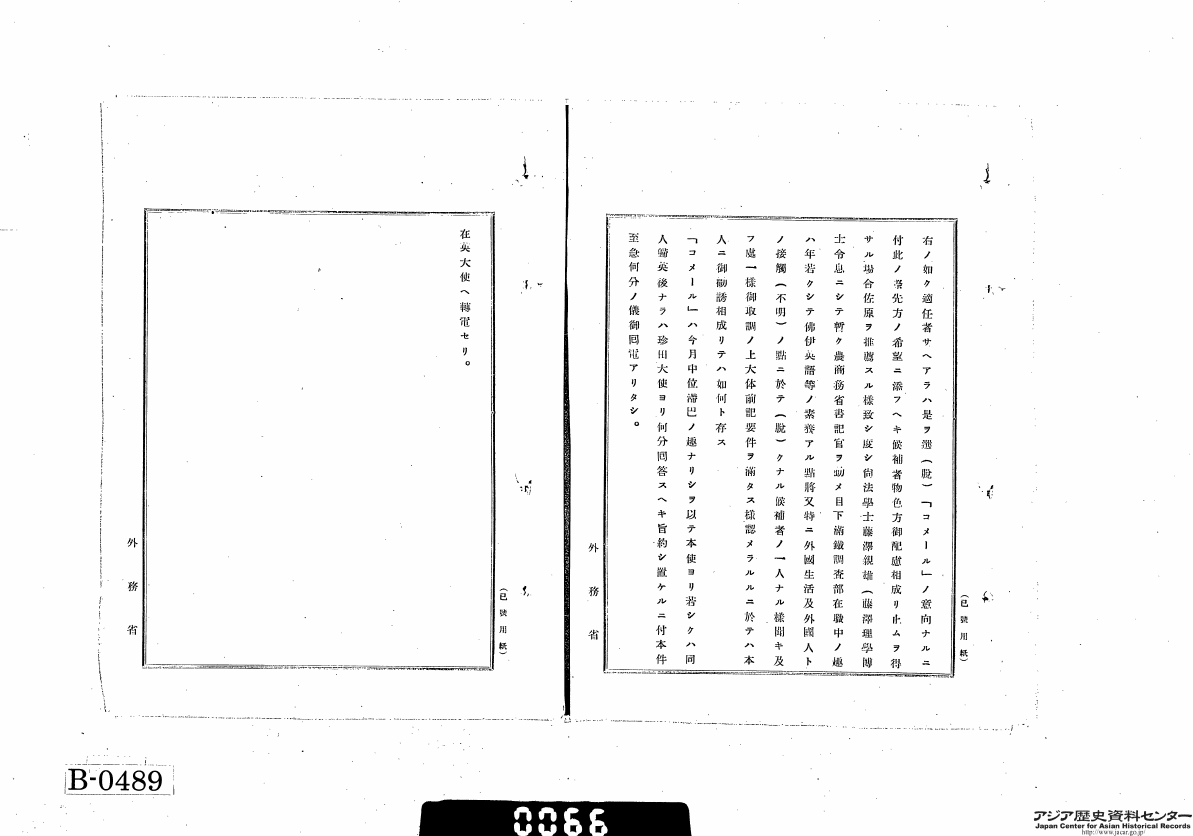 Image 6: Ambassador to France Matsui correspondence to Foreign Minister Uchida, No. 912, May 29, 1920 (Matters Related to League of Nations Secretariat / Personal Matters, Assignments 1 (Ref. B04014005000, image 61).
Image 6: Ambassador to France Matsui correspondence to Foreign Minister Uchida, No. 912, May 29, 1920 (Matters Related to League of Nations Secretariat / Personal Matters, Assignments 1 (Ref. B04014005000, image 61).Research in recent years has clarified the work that Japanese staffers at the League of Nations' Secretariat did in terms of presenting information to Japan about the League's activities, their work to inform the Secretariat about Japan and East Asia, and the activities they undertook that went beyond the boundaries of the respective sections to which they were attached. Against the backdrop of Japan's honored status at the League as one of its permanent Council members, the contributions that Japanese made to the body went beyond those of under-secretaries Nitobe and Sugimura to also include those of these other individuals who at a youthful age made their way to Geneva to help this international organization. One century after the League's founding, perhaps now might be a time when we should once again keep them in our memories.
Literature Cited
Banjō Kenji. "Kokusai Renmei jimukyoku ni okeru Nihonjin jimukyokuin: Kokusai kikō no 'gurōbaru-ka' e no mosaku" [Japanese Officers in the League of Nations Secretariat: Endeavor for the "Globalization" of the League]. International Relations, no. 1982 (2020), pp. 111–126.
Shinohara Hatsue. Kokusai Renmei [The League of Nations]. Tokyo: Chūkō Shinsho, 2010.
Kenji Banjō, Assistant Researcher, JACAR

